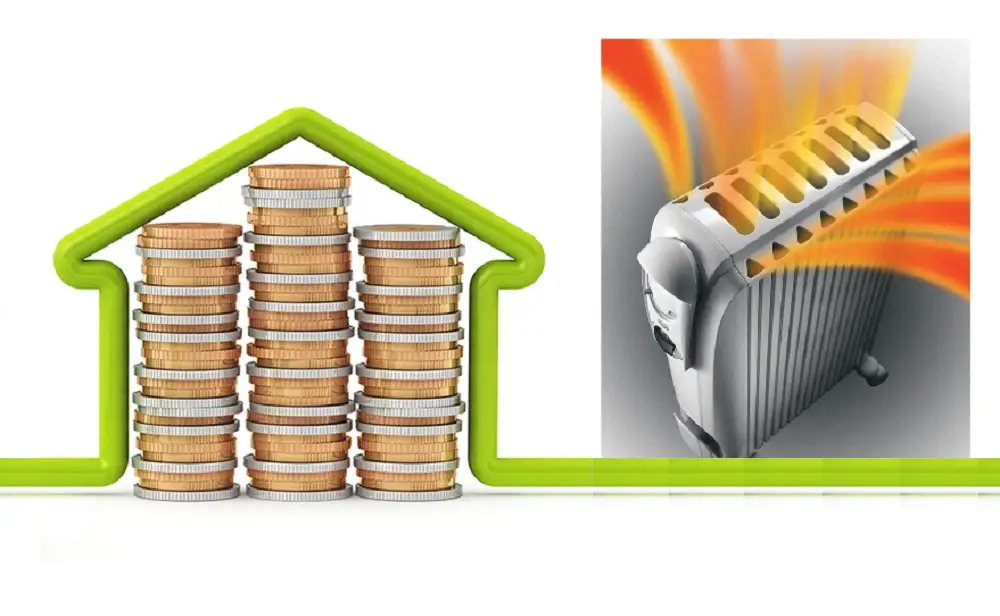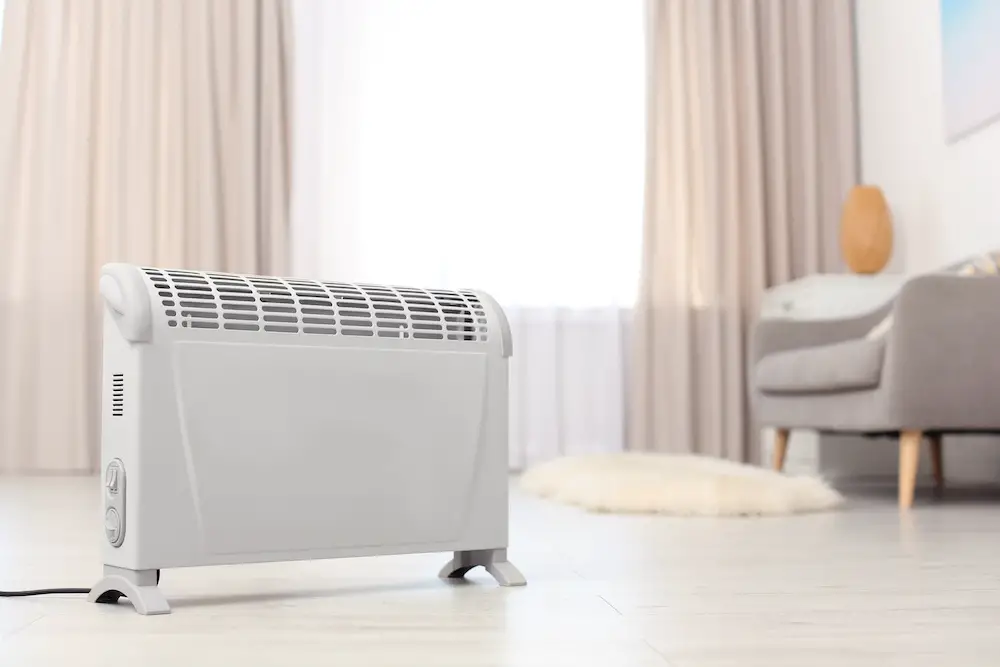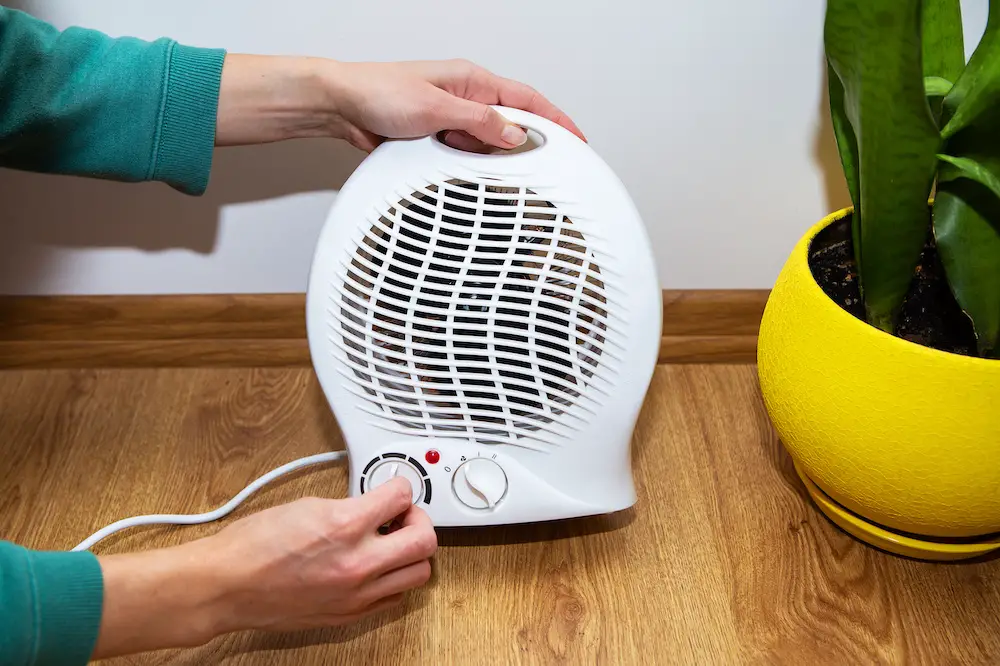Keeping our homes habitable involves keeping the indoor air quality optimal.
As you probably already know, indoor air quality changes from season to season, and we all rely on electronics to get the comfort we need.
Do you ever wonder how much electricity a space heater uses?
Are the savings on energy costs really that substantial compared to running centralized heating or a combustion heating system?
We’ll be answering these questions in the following sections, so be sure to keep reading.
Do Space Heaters Use a Lot of Electricity?
When comparing summers and cold months, it is almost always more difficult to keep energy costs down in the freezing winter.
Sometimes, grabbing more blankets or putting on more clothes is just not enough.
One way to reduce your electric bills is by using a space heater instead of turning up the central heat.
We have run our own study on temp settings. Larger swings in temp cost more over time than smaller temp swings.
This means keeping your low temp setting at night a little higher, so it is less work to warm it up. Do not set more than 7 degrees of change at a time.
Electric vs. Combustion Space Heaters
Generally speaking, electric space heaters are more expensive to operate than combustion space heaters.
Still, many prefer using electric units because it doesn’t have the harmful effects of poor indoor air quality from combustion heater use.
Keep in mind, though, that electric space heaters vary in size and heating element, which means their energy consumption also varies.
For one, convection space heaters use much more electricity than radiant heating devices.
After all, radiant heating uses infrared radiation to heat objects and people directly in its line of sight.
If you use electric space heaters in every room in your house, it will require a lot more electricity than central heat.
In some cases, space heaters are essential when central heating is too costly to install or is inadequate.
Electric space heaters only use a fraction of energy costs if you only use them to heat one room or supplement inadequate heat in a room.
If you choose electric units, the best options use a heat transfer liquid, such as oil.
The electric heating element heats the oil that serves as heat storage, which means the heater cycles less and uses less electricity.
On Energy Star Qualification
On another note, Energy Star is the most trusted entity for rating appliances for energy efficiency.
The United States Environmental Protection Agency (US EPA) does not currently label electric space heaters with Energy Star qualifications.
And the US EPA does not have plans to label them anytime soon.
Simply put, modern electric space heaters do not yet meet the right amount of efficiency that qualifies them for environmental protection.
Nevertheless, that doesn’t mean you will have to sacrifice thermal comfort and indoor air quality.
To reduce the electricity consumption of electric heaters, use them sparingly and in smaller spaces.

How Much Electricity Does an Electric Heater Use?
To find out how much electricity a particular electric space heater uses, you will need to look at several factors.
Look for your device’s wattage, quantify the number of hours it will operate, and determine the electricity rate in your area.
You will find the wattage somewhere on your device or on the box it came in.
Your previous month’s electric bill should have some indication of the rate per kilowatt-hour.
If it doesn’t, divide the bill amount with the total usage in kilowatt-hours to get the kilowatt-hour rate.
Once you have all three factors, multiply the wattage by the number of operating hours, and divide the resulting amount by 1,000.
Finally, multiply the second result with the kilowatt-hour rate to get the energy cost for the number of operating hours you have chosen.
For example, a 1,500-watt space heater that operates for four hours in an area with utility charges of $0.21 per kilowatt-hour consumes $1.26 of electricity.
If you use the same space heater in the same area for a whole day, you will need to pay $7.56.
Alternatively, using the same conditions, a 1500-watt space heater will consume $0.32 of electricity for every hour of use.
How Much Does It Cost to Run a Space Heater for a Month?
Using the same 1500-watt space heater continuously for a whole month will incur electric bill charges of $226.80.
Again, note that this amount is equivalent to 30 days of continuous use.
Let’s say you only use it for 20 days every month. You will incur a monthly charge of $151.20.
Some smaller electric space heaters use a maximum wattage of 250 watts.
The utility company should charge you $37.80 for every 30 days and $25.20 for every 20 days of continuous use.
Following the same procedure described above, you can easily answer how much electricity does an electric heater use.
The costs of running a space heater will depend on its wattage, too.
Suppose you have a 750-watt heater and another 2,000-watt heater, and you use them separately in similar-sized rooms.
You will notice how they don’t consume the same amount of electricity.
This is because the 750-watt heater will take longer to warm the room, while you will turn off the 2,000-watt heater sooner.

Is It Cheaper To Run a Space Heater or Electric Heat?
You might want to check how much you can save if you use combustion space heaters, electric space heaters, central heat, or a mixture of the three.
As already stated earlier, it is always cheaper to use combustion instead of electricity.
The problem is, unvented combustion heaters will have a toll on your health if used indoors.
This immeasurable toll will prove to be more costly than electric heat, and it will reflect on your hospital bills.
In many US states, unvented combustion heaters are banned from use indoors.
These devices emit harmful substances, such as nitrogen oxides, carbon monoxide, and water vapor.
They also use up the oxygen in the room to burn kerosene or natural gas.
If you opt for combustion heaters for indoor use, go for the vented models.
These use outside oxygen for fuel instead of the unvented ones that gobble up the good air inside your house.
Moreover, you do not have to use an electric space heater continuously.
Only use it to supplement the inadequate heat coming from your centralized heating system.
Better yet, turn off your central heat and use the electric space heater in a more confined space instead.
If you want to heat a whole house to ensure thermal comfort throughout every room, set the preferred temperature on your thermostat and stick to central heat.
When heating a whole house, electric central heat is always cheaper than using individual space heaters for every room.
How To Reduce Utility Bills for Heating
There are several ways to decrease your energy bills indirectly.
It is a proven fact that outdoor temperatures will affect your thermal comfort during the winter if your house does not have enough insulation and caulking.
You can also save on electricity bills by retaining enough heat in commonly used spaces and turning down heat where it is not necessary.
Here are more tricks and tips you can do:
1. Insulate or Add More Insulation
People often overlook the value of insulation whenever they assess how to save on their energy bills.
Insulation can go a long way in helping you cut back on costs, especially during the chilly winter months.
If a house is properly insulated, internal spaces will have better heat gain than heat loss, and heating requirements will fall significantly.
Giving your house an annual inspection will help you find the walls, ceilings, floors, and crawl spaces that require insulation improvements.
With sufficient insulation, cold air stays out, and warm air stays inside.
2. Secure All Outlets for Heat Loss
Your house has boreholes on the walls, between floors, and where plumbing pipes and wire conduits pass through.
These holes can act as air bypasses that allow airflow between spaces.
You can reduce heat loss by sealing these holes using caulking material.
Additionally, some fenestrations may not have enough glazing to prevent the cold air from entering your rooms.
If your openings don’t have shutters, it may be high time you invest in some, especially in parts of your house facing the prevailing winds.
3. Use Strategic Heating
When it comes to space heaters, the number one rule is to use them sparingly and only in specific places.
If you and your family use only a few spaces at a time, turn down the central heat and take advantage of space heating in a smaller area.
Moreover, you can minimize heater use by putting on more clothes or adding more blankets.
During your sleeping hours, set the thermostat to a tolerable minimum, and use timers available on your space heaters.
You may also want to consider replacing your thermostat with a smart modern one to save more on your bills.
Remember, it is not advisable to fall asleep with a fire hazard, such as a space heater continuously running while you sleep.
How Much Electricity Does a Space Heater Use?
There is no specific answer to the question: how much electricity does a space heater use?
It depends on the size of your space heater and what particular wattage it uses during operation.
The answer also depends on how many hours you use a particular space heater.
If you are looking for specific utility bill costs for using a space heater, follow the example presented earlier and compute based on your utility company’s kilowatt-hour rate.
Also, consider that the cost of electricity varies over time and upon actual consumption.

